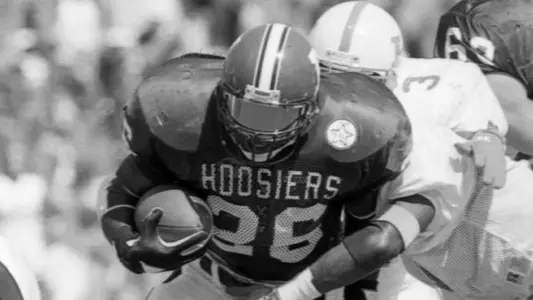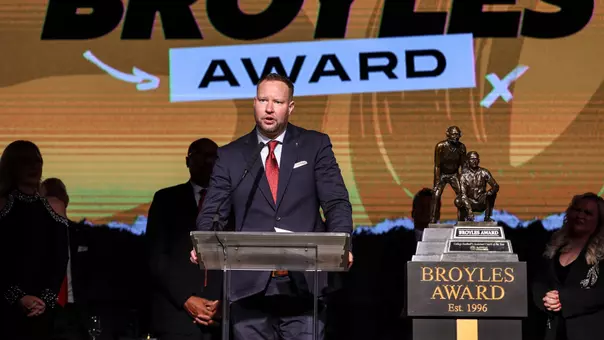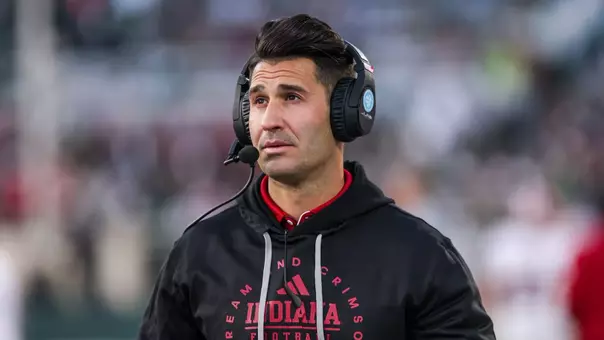Indiana University Athletics

Dunbar, Randle El on CFB Hall of Fame Ballot
6/7/2024 11:00:00 AM | Football
IRVING, Texas – The National Football Foundation (NFF) & College Hall of Fame announced the names for the 2025 ballot for induction into the College Football Hall of Fame, which includes a pair of Indiana All-Americans in running back Vaughn Dunbar (1990-91) and quarterback Antwaan Randle El (1998-01).
Dunbar was a unanimous first-team All-American in 1991 when he led the nation in rushing (1,805) and finished sixth in Heisman voting. The running back was a first-team All-Big Ten selection that season when he led the conference with 150.4 yards per game. He posted consecutive 1,000-yard seasons and finished his career No. 3 on the career rushing charts at IU with 3,029 yards, a total that currently sits No. 7 all-time in program history.
Dunbar led the Hoosiers to a pair of bowl appearances and rushed for a total of 197 yards in the 1990 Peach Bowl and 1991 Copper Bowl. In a 24-0 victory over Baylor Copper Bowl, Dunbar totaled 106 rushing yards and one touchdown to earn MVP honors at Arizona Stadium in Tempe, Arizona.
One of the most dynamic offensive performers in college football history, Randle El was the first quarterback to ever claim the Big Ten Freshman of the Year and Big Ten Player of the Year honors in a career, earning the top rookie award in 1998 and player of the year accolades in 2001. A 2001 first-team All-America selection by the Football Writers Association of American, he finished 6th in Heisman Trophy balloting in 2001, after finishing 13th in 2000.
Randle El was the first player in NCAA history to score 40 touchdowns (45) and throw for 40 touchdowns (42) in a career, first to record over 2,500 yards of total offense in four seasons, first to pass for over 6,000 yards and rush for over 3,000 yards in a career. He remains the IU career total offense leader (11,364), more than 3,000 yards ahead of second place, and continues to rank No. 2 on the career passing yardage (7,469), rushing yardage (3,895) and touchdowns (45) charts.
The Thompson-Randle El Award, given to the Big Ten's best freshman football student-athlete, is named in his honor. A tremendous all-around athlete, while at Indiana Randle El also played on the men's basketball and baseball teams. He played in the NFL for 10 years with Pittsburgh and Washington and was a member of the winning Super Bowl team in Pittsburgh in 2005.
Indiana already has six members of the program enshrined in the College Football Hall of Fame, with Anthony Thompson the most recent selection in 2007. Alvin "Bo" McMillin (elected 1951), Pete Pihos (1966), Zora Clevenger (1968), George Taliaferro (1981) and John Tavener (1990) are also among the less than two one-hundredths of a percent (.02%) of those who have played the game during the past 152 years to earn the distinction.
The 2025 College Football Hall of Fame Class will be officially inducted during the 67th NFF Annual Awards Dinner Presented by Las Vegas on Dec. 9, 2025 at the Bellagio Hotel & Resort, and they will also be honored at their respective schools with an NFF Hall of Fame On-Campus Salute, presented by Fidelity Investments, during the 2025 season.
Of the 5.7 million individuals who have played college football since Princeton first battled Rutgers on Nov. 6, 1869, only 1,093 players have earned induction into the College Football Hall of Fame, or less than two one-hundredths of a percent (.02%) of those who have played the game during the past 154 seasons. From the coaching ranks, 233 individuals have achieved Hall of Fame distinction.
There are 11 NFF National Scholar-Athletes on the 2025 Ballot, including FBS players Jeff Bregel (USC), Gregg Carr (Auburn), Brad Culpepper (1991 Campbell Trophy® recipient from Florida), Greg Eslinger (Minnesota), Graham Harrell (Texas Tech), Alex Mack (2008 Campbell Trophy® recipient from California), Darrin Smith (Miami, FL) and Manti Te'o (Notre Dame). The divisional NFF National Scholar-Athlete nominees on the 2025 ballot include Keith Elias (Princeton), Gerald Quinlivan (Buffalo), and Thomas Stenglein (Colgate).
The NFF has recognized 922 NFF National Scholar-Athletes since 1959, and only 44 have earned the distinction as both a Hall of Famer and an NFF National Scholar-Athlete, creating arguably one of the most unique and elite groups in all of sports. And of those 44 dual honorees, only Peyton Manning (Tennessee), Matt Stinchcomb (Georgia), Tim Tebow (Florida) and Danny Wuerffel (Florida) have also claimed The William V. Campbell Trophy®.
The criteria for Hall of Fame consideration include:
· First and foremost, a player must have received First-Team All-America recognition by a selector that is recognized by the NCAA and utilized to comprise its consensus All-America teams.
· A player becomes eligible for consideration by the Foundation's Honors Courts 10 full seasons after his final year of intercollegiate football played.
· While each nominee's football achievements in college are of prime consideration, his post-football record as a citizen is also weighed. He must have proven himself worthy as a citizen, carrying the ideals of football forward into his relations with his community. Consideration may also be given for academic honors and whether the candidate earned a college degree.
· Players must have played their last year of intercollegiate football within the last 50 years.* For example, to be eligible for the 2024 ballot, the player must have played his last year in 1974 or thereafter. In addition, players who are playing professionally and coaches who are coaching on the professional level are not eligible until after they retire.
· A coach becomes eligible three full seasons after retirement or immediately following retirement provided he is at least 70 years of age. Active coaches become eligible at 75 years of age. He must have been a head football coach for a minimum of 10 years and coached at least 100 games with a .600 winning percentage.
· Nominations may only be submitted by the current athletics director, head coach or sports information director (SID) of a candidate's collegiate institution. Nominations may also be submitted by the president/executive director of a dues-paying chapter of the National Football Foundation.
*Players who do not comply with the 50-year rule may still be eligible for consideration by the Football Bowl Subdivision and Divisional Veterans Committees. Veterans Committee candidates must still meet First Team All-America requirement.
Once nominated for consideration, all FBS player candidates are submitted to one of eight District Screening Committees, depending on their school's geographic location, which conducts a vote to determine who will appear on the ballot and represent their respective districts. Each year, approximately 15 candidates, who are not selected for the Hall of Fame but received significant votes in the final selection, will be named automatic holdovers and will bypass the district screening process and automatically appear on the ballot the following year. Additionally, the Veterans Committee may make recommendations to the Honors Court for exceptions that allow for the induction of players who played more than 50 years ago. The Honors Court annually reviews the Hall of Fame criteria to ensure a fair and streamlined process.
Dunbar was a unanimous first-team All-American in 1991 when he led the nation in rushing (1,805) and finished sixth in Heisman voting. The running back was a first-team All-Big Ten selection that season when he led the conference with 150.4 yards per game. He posted consecutive 1,000-yard seasons and finished his career No. 3 on the career rushing charts at IU with 3,029 yards, a total that currently sits No. 7 all-time in program history.
Dunbar led the Hoosiers to a pair of bowl appearances and rushed for a total of 197 yards in the 1990 Peach Bowl and 1991 Copper Bowl. In a 24-0 victory over Baylor Copper Bowl, Dunbar totaled 106 rushing yards and one touchdown to earn MVP honors at Arizona Stadium in Tempe, Arizona.
One of the most dynamic offensive performers in college football history, Randle El was the first quarterback to ever claim the Big Ten Freshman of the Year and Big Ten Player of the Year honors in a career, earning the top rookie award in 1998 and player of the year accolades in 2001. A 2001 first-team All-America selection by the Football Writers Association of American, he finished 6th in Heisman Trophy balloting in 2001, after finishing 13th in 2000.
Randle El was the first player in NCAA history to score 40 touchdowns (45) and throw for 40 touchdowns (42) in a career, first to record over 2,500 yards of total offense in four seasons, first to pass for over 6,000 yards and rush for over 3,000 yards in a career. He remains the IU career total offense leader (11,364), more than 3,000 yards ahead of second place, and continues to rank No. 2 on the career passing yardage (7,469), rushing yardage (3,895) and touchdowns (45) charts.
The Thompson-Randle El Award, given to the Big Ten's best freshman football student-athlete, is named in his honor. A tremendous all-around athlete, while at Indiana Randle El also played on the men's basketball and baseball teams. He played in the NFL for 10 years with Pittsburgh and Washington and was a member of the winning Super Bowl team in Pittsburgh in 2005.
Indiana already has six members of the program enshrined in the College Football Hall of Fame, with Anthony Thompson the most recent selection in 2007. Alvin "Bo" McMillin (elected 1951), Pete Pihos (1966), Zora Clevenger (1968), George Taliaferro (1981) and John Tavener (1990) are also among the less than two one-hundredths of a percent (.02%) of those who have played the game during the past 152 years to earn the distinction.
The 2025 College Football Hall of Fame Class will be officially inducted during the 67th NFF Annual Awards Dinner Presented by Las Vegas on Dec. 9, 2025 at the Bellagio Hotel & Resort, and they will also be honored at their respective schools with an NFF Hall of Fame On-Campus Salute, presented by Fidelity Investments, during the 2025 season.
Of the 5.7 million individuals who have played college football since Princeton first battled Rutgers on Nov. 6, 1869, only 1,093 players have earned induction into the College Football Hall of Fame, or less than two one-hundredths of a percent (.02%) of those who have played the game during the past 154 seasons. From the coaching ranks, 233 individuals have achieved Hall of Fame distinction.
There are 11 NFF National Scholar-Athletes on the 2025 Ballot, including FBS players Jeff Bregel (USC), Gregg Carr (Auburn), Brad Culpepper (1991 Campbell Trophy® recipient from Florida), Greg Eslinger (Minnesota), Graham Harrell (Texas Tech), Alex Mack (2008 Campbell Trophy® recipient from California), Darrin Smith (Miami, FL) and Manti Te'o (Notre Dame). The divisional NFF National Scholar-Athlete nominees on the 2025 ballot include Keith Elias (Princeton), Gerald Quinlivan (Buffalo), and Thomas Stenglein (Colgate).
The NFF has recognized 922 NFF National Scholar-Athletes since 1959, and only 44 have earned the distinction as both a Hall of Famer and an NFF National Scholar-Athlete, creating arguably one of the most unique and elite groups in all of sports. And of those 44 dual honorees, only Peyton Manning (Tennessee), Matt Stinchcomb (Georgia), Tim Tebow (Florida) and Danny Wuerffel (Florida) have also claimed The William V. Campbell Trophy®.
The criteria for Hall of Fame consideration include:
· First and foremost, a player must have received First-Team All-America recognition by a selector that is recognized by the NCAA and utilized to comprise its consensus All-America teams.
· A player becomes eligible for consideration by the Foundation's Honors Courts 10 full seasons after his final year of intercollegiate football played.
· While each nominee's football achievements in college are of prime consideration, his post-football record as a citizen is also weighed. He must have proven himself worthy as a citizen, carrying the ideals of football forward into his relations with his community. Consideration may also be given for academic honors and whether the candidate earned a college degree.
· Players must have played their last year of intercollegiate football within the last 50 years.* For example, to be eligible for the 2024 ballot, the player must have played his last year in 1974 or thereafter. In addition, players who are playing professionally and coaches who are coaching on the professional level are not eligible until after they retire.
· A coach becomes eligible three full seasons after retirement or immediately following retirement provided he is at least 70 years of age. Active coaches become eligible at 75 years of age. He must have been a head football coach for a minimum of 10 years and coached at least 100 games with a .600 winning percentage.
· Nominations may only be submitted by the current athletics director, head coach or sports information director (SID) of a candidate's collegiate institution. Nominations may also be submitted by the president/executive director of a dues-paying chapter of the National Football Foundation.
*Players who do not comply with the 50-year rule may still be eligible for consideration by the Football Bowl Subdivision and Divisional Veterans Committees. Veterans Committee candidates must still meet First Team All-America requirement.
Once nominated for consideration, all FBS player candidates are submitted to one of eight District Screening Committees, depending on their school's geographic location, which conducts a vote to determine who will appear on the ballot and represent their respective districts. Each year, approximately 15 candidates, who are not selected for the Hall of Fame but received significant votes in the final selection, will be named automatic holdovers and will bypass the district screening process and automatically appear on the ballot the following year. Additionally, the Veterans Committee may make recommendations to the Honors Court for exceptions that allow for the induction of players who played more than 50 years ago. The Honors Court annually reviews the Hall of Fame criteria to ensure a fair and streamlined process.
FB: Curt Cignetti Media Availability (1/17/26)
Saturday, January 17
FB: Curt Cignetti Media Availability (1/16/26)
Friday, January 16
FB: CFP National Championship Game - Student-Athlete Press Conference
Tuesday, January 13
FB: Curt Cignetti Media Availability (1/12/26)
Monday, January 12




